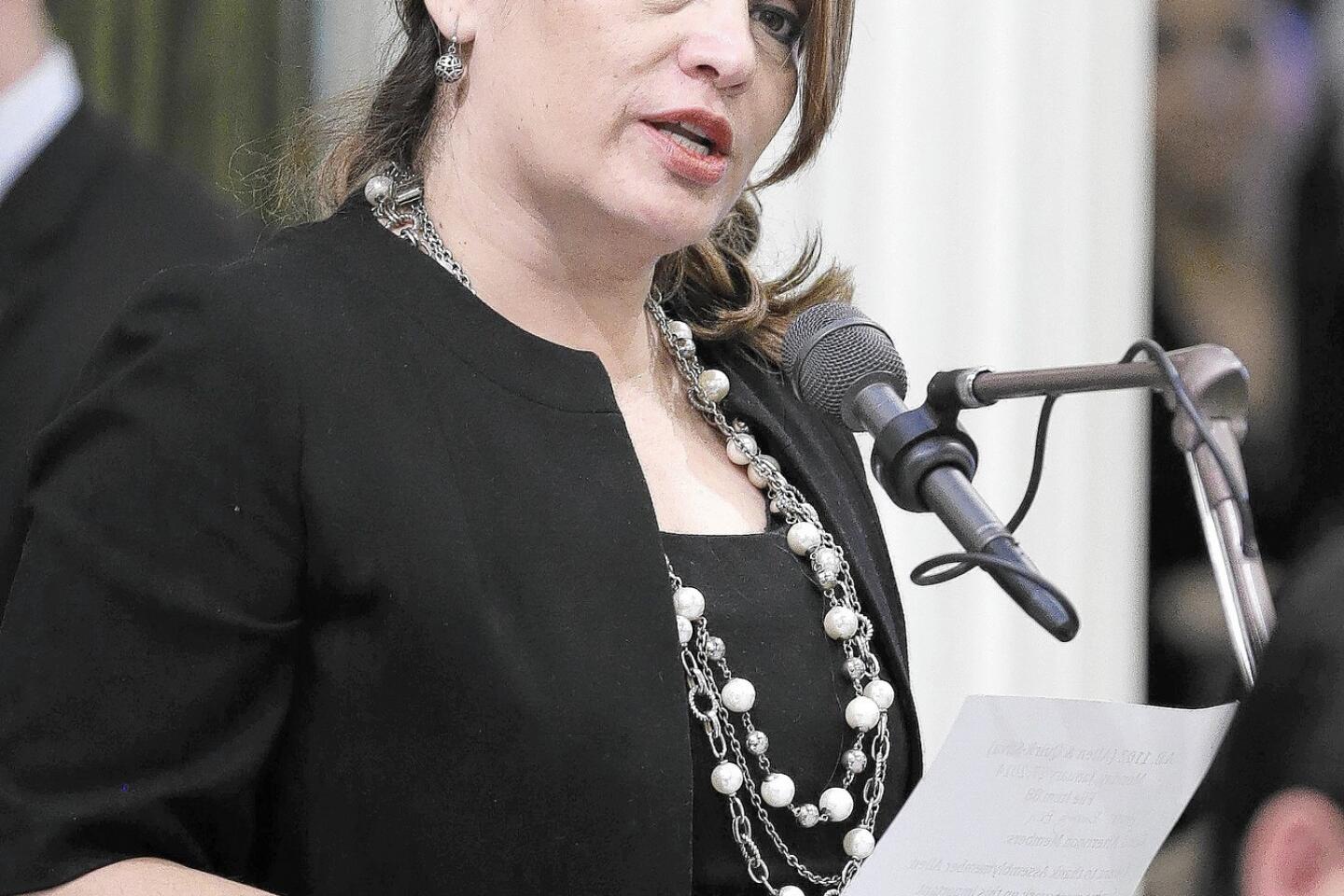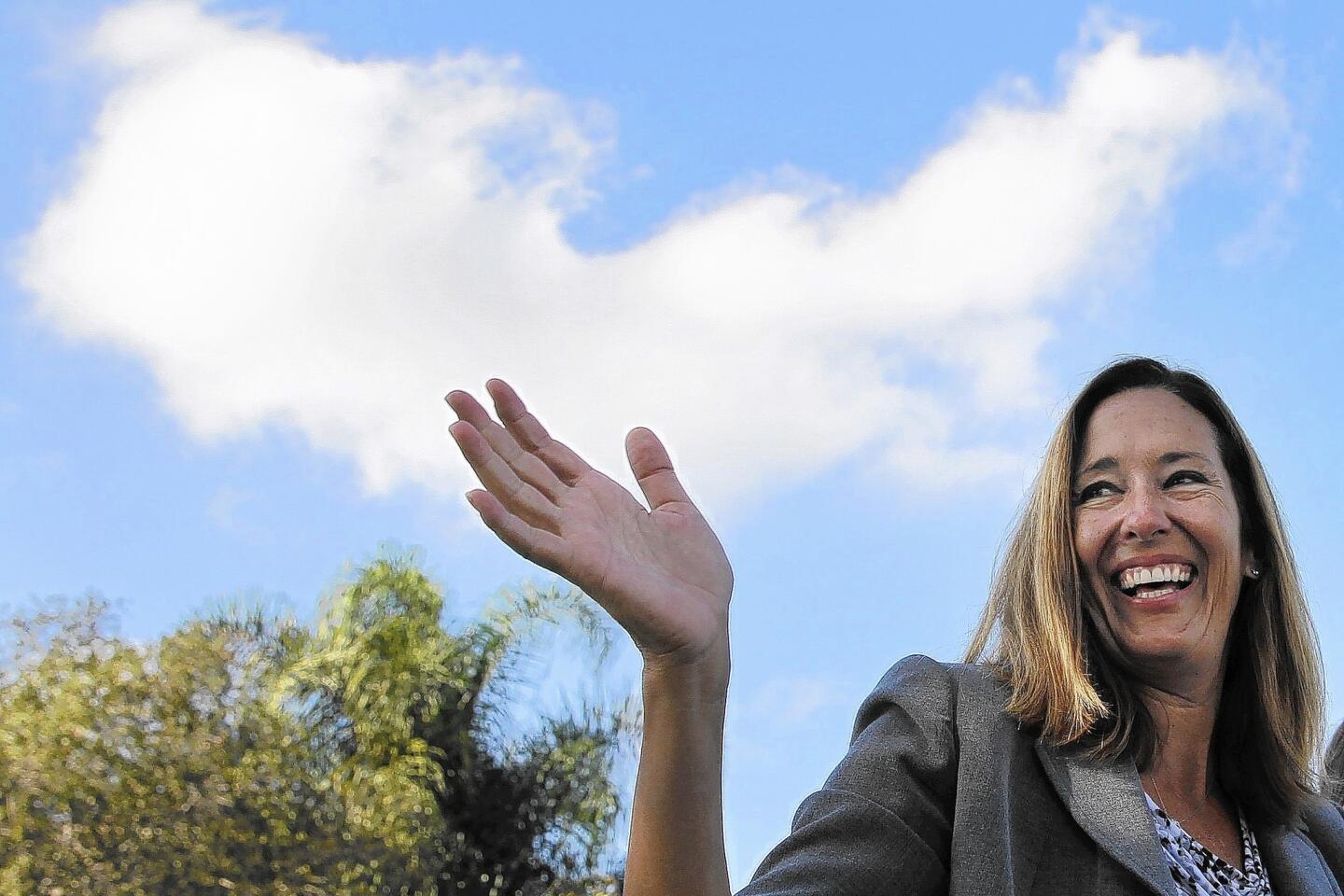Two Assembly races vital to Democrats’ bid to retain supermajority
- Share via
Reporting from FULLERTON — Assemblywoman Sharon Quirk-Silva, a first-term Democrat facing a tough reelection bid, stood in a Sizzler dining room one recent evening with a rallying cry for her supporters.
“Do not let others define our district for us,” she urged members of a local Democratic club. “It’s too simplistic to do the data and say, ‘It’s just a Republican stronghold.’ ”
Until recently, it was. And in one of the most closely watched legislative contests this year, Republicans hope to flip it back.
In Ventura County, meanwhile, Democrats are playing offense in another key race, trying to pick up an open seat most recently held by the GOP.
Both contests are pivotal to whether Democrats retain their supermajority in the state Assembly.
Each is in a district where changing demographics recently transformed solidly Republican terrain into swing territory. But although Democrats may have expanded their playing field, they could be hobbled by lackluster turnout at the polls next month.
As Democratic registration climbs in these districts, “the blessing is they’re getting more voters that are going to be supporting Democratic candidates,” said Paul Mitchell, vice president of the bipartisan firm Political Data Inc.
“The curse,” he said, “is that more of those voters are younger and tend to have a lower turnout.”
There are currently 55 Democrats in the Assembly, one more than needed for the two-thirds supermajority. That voting bloc is handy for passing tax increases or placing measures on the ballot without Republican votes.
Retaining this advantage will be moot if Democrats do not regain the supermajority they lost in the Senate this year amid corruption scandals. But it’s a point of pride, even in a year when voter turnout projections favor Republicans.
The Orange County race is a tossup, according to the California Target Book, an almanac of state politics.
In 2012, Quirk-Silva notched an upset victory over a sitting Republican, buoyed by strong Democratic turnout for the presidential election.
Now she’s up against Republican Young Kim, who served in the area for two decades as an aide to Rep. Ed Royce (R-Fullerton).
Kim is running on familiar GOP themes — decrying burdensome regulations on business and pledging to fend off any Democratic attempts to alter Proposition 13, the state’s landmark property tax law. Quirk-Silva says she opposes any attempt to change the law.
A former teacher who also served on the Fullerton City Council, Quirk-Silva has emphasized local issues, namely her legislation for a new veterans cemetery in Orange County. She appeared this week with Gov. Jerry Brown at the cemetery’s future site in Irvine.
Fundraising advantages typically go to the incumbent. But Kim has gone toe-to-toe with Quirk-Silva in the money race, collecting nearly $1.5 million to Quirk-Silva’s $1.8 million.
New demographics are a potent undercurrent in this race to represent the 65th Assembly District. Kim, like 5% of the district, is Korean American. Asian Americans as a whole make up nearly 20%, according to Political Data.
Kim, noting that Asian Americans are the fastest growing ethnic group in North Orange County, says she has an advantage as “a candidate that looks like and talks like the district.”
The same could be said of Quirk-Silva, who is Latino, as is about 20% of the district.
“There’s no doubt — your grandfather’s Orange County has changed,” said Fred Smoller, professor of political science at Chapman University.
Change is also afoot 60 miles northwest, in Ventura County, where Jacqui Irwin, a Democratic city councilwoman from Thousand Oaks, is squaring off against Rob McCoy, a Newbury Park pastor.
For four years the seat has been held by Assemblyman Jeff Gorell, a moderate Camarillo Republican now running for Congress.
Herbert Gooch, a political science professor at California Lutheran University, said the district was once “very strongly Republican. That’s slowly eroded over time.”
The Democratic tilt occurred, in part, when the district was redrawn in 2011 to include Oxnard, which has a large Latino population. The party now holds almost a 5 percentage point registration lead over Republicans in the district, and Target Book gives a slight edge in the race to the Democrat.
At a recent parade celebrating the 50th anniversary of Thousand Oaks’ founding, complete with high school pep bands and classic cars, Irwin — the only Democrat on the City Council — rode in a float with other city officials.
Afterward, she said her nine years as a council member for the conservative-leaning city were spent “looking for common ground, working with Republicans to get things done for our residents.”
Even as Irwin highlights her moderate credentials, she has leaned heavily on the party’s labor-union base for fundraising and foot soldiers.
A few hours after the parade, she stopped by a backyard barbecue for members of local carpenters, builders and electrical workers unions, who had been knocking on doors in Oxnard on her behalf.
“She’s for working-class people,” said Jose Lopez, a 33-year-old electrician from Oxnard. “She knows that when more jobs are here locally, the money grows here locally.”
The next day, at Godspeak Calvary Church, McCoy was lamenting the federal and state debt and the high rate of long-term unemployment. He urged his congregants to cast off political apathy.
“Do something!” he exhorted.
A local pastor for 14 years, McCoy is a dexterous speaker. At the pulpit and on the stump, he is alternately theatrical and self-effacing, weaving standard Republican slams against government regulation with calls for post-partisan unity.
Linda Gowan, a member of McCoy’s church, said she had been politically disengaged until recently but was “moved by Rob’s passion and vision for California, and absolutely skewered by his call to action.”
Democrats say McCoy is too extreme for the 44th Assembly District. In television and mail ads, they’re highlighting comments he made at a 2011 tea party rally, calling for Social Security to be abolished.
McCoy qualifies that statement now, saying he was recounting a conversation with his father-in-law and that he does not want to end Social Security for current retirees. Rather, he said, he wants to revamp it for younger generations.
Concerns that McCoy may be too conservative were shared by some in the Republican establishment. Groups funded primarily by the California Chamber of Commerce and GOP mega-donor Charles Munger spent more than $700,000 against him in the June primary.
Some contributors have since come around. Munger gave the McCoy campaign the maximum individual donation this month, and the state party has sent in more than a half-million dollars. McCoy has brought in $1.1 million; Irwin has raised nearly $1.5 million.
[email protected]
Twitter: @melmason
More to Read
Sign up for Essential California
The most important California stories and recommendations in your inbox every morning.
You may occasionally receive promotional content from the Los Angeles Times.













